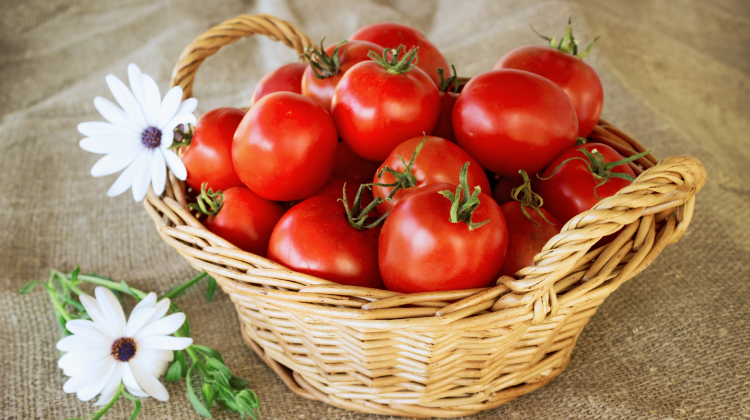Are Tomatoes Good For You? 6 Stunning Benefits Of Tomatoes 2024

We are all told that if we want to live healthy lives, we should eat more fruits and vegetables. This is because these foods contain vitamins, minerals, antioxidants, and other compounds that the body needs to stay healthy and fight disease.
Some of these plant-based foods have even been elevated to superfood status because they are so rich in nutrients. The tomato is one such food that has gained this title. However, is the tomato worthy of the title of a superfood, and are tomatoes good for you?
The good news for those who like tomatoes is that they are a healthy plant-based food containing antioxidants and other health-promoting substances, such as vitamin C.
You can eat tomatoes raw or cooked, and there are different varieties to try. Raw tomatoes are the tastiest, and you can even drink tomato juice, too. You really only need to avoid eating tomatoes if you have an allergy.
6 Amazing Health Benefits Of Eating Tomatoes
Here are six reasons why you should consume tomatoes:
- Prevent cancer
- Improve skin health
- Improve eye health
- Improve digestive health
- Boost heart health
- Boost immune system
Health Benefits Of Tomatoes
Prevent Cancer
Much has been written about tomatoes and cancer, especially prostate cancer. It is thought that lycopene, the bright red carotenoid which gives tomatoes their red color, can help prevent prostate cancer from developing if eaten regularly.
However, this link between lycopene and prostate cancer prevention does need more human trials to support the claims.
Some clinical studies have shown that lycopene can lower serum PSA[1] levels in prostate cancer patients, but more research is needed here too.
Processed tomato products such as tomato sauce, tomato paste, and tomato juice have more lycopene content than raw tomatoes. This is because these products are manufactured using highly concentrated forms of tomato, and the processing helps to release the lycopene content.
Therefore, if possible, tomatoes and tomato products should be included in the diet. The best sauces and juices are the ones that are unsweetened and only contain natural sugars. It is these highly concentrated products that have been used in medical research.
Lycopene has also been found to be better absorbed if it is eaten with a source of fat. This could include olive oil, which might be used as a dressing in a salad containing fresh raw tomatoes or a pizza with various cheese toppings.
Improve Skin Health
Lycopene is thought to be beneficial to skin health because it is an antioxidant that can help prevent damage caused by environmental factors such as UV light and pollution. In addition, lycopene-based skin products can allow this antioxidant to come in direct contact with the skin, increasing the amount of lycopene that is absorbed directly into the cells.
Some research has suggested that lycopene supplements can reduce the reactive reddening of the skin caused by too much sun exposure by 25 percent, but more research is needed before it can be thought of as a UV-protecting skin supplement.
Lycopene extract is, however, also used to prevent wrinkles and as an anti-aging ingredient in skin formulas. This is because of its powerful antioxidant activity that prevents damage from free radicals, which often occur in skin cells and throughout the body. This is why antioxidants and their anti-aging properties are so important in the diet.
Improve Eye Health
It’s not just the rich lycopene content that makes tomatoes healthy. They also contain vitamins K and C. These are important to health because vitamin C also helps repair the damage caused by free radicals. In contrast, vitamin K is essential for bone health.
They also contain beta-carotene, which is converted into vitamin A in the body. Vitamin A can help to keep the eyes healthy and prevent age-related vision diseases such as age-related macular degeneration[2] from developing.
Lutein and zeaxanthin[3] are also in tomatoes, and these antioxidants are present in the eye as well. Concentrations of these two compounds can be found in the lens, retina, and macula. Both can help to prevent common eye problems such as vision loss from developing later in life.
Improve Digestive Health
Tomatoes can help improve digestion and prevent constipation because of their fiber and water content. Raw tomatoes contain 1.5 grams (g) of fiber and 6 ounces of water.
Even sundried tomatoes contain fiber, but the fluid content of tomatoes in this form is missing, so raw tomatoes are best when helping to keep you regular.
Boost Heart Health
Tomatoes contain various antioxidants that can boost heart health. They do this due to their antioxidant properties, preventing the inflammation that contributes to atherosclerosis[4], the gradual build-up of plaque within the wall of the arteries.
These deposits, which consist of calcium, cholesterol, and other substances, cause hardening and thickening of the arterial walls that restrict blood flow to the heart muscle. Such blocked circulation can eventually lead to heart disease, chest pain, heart attacks, and strokes.
The nutrients in tomatoes are thought to help lower low-density lipoprotein (LDL) cholesterol levels in the blood and improve the integrity of the arterial wall by inhibiting the damage caused by LDL oxidation[5].
Boost Immune System
The human immune system relies on a continuous supply of nutrients from the diet to stay in optimum shape.
However, some foods, such as those high in sugar, can damage the immune system, while antioxidant-rich foods can help increase the ability of the immune system to fight infections by increasing the number of infection-fighting cells the immune system produces.
Tomato Nutrition
One cup of chopped or sliced raw tomato contains 32 calories, 2.2 g of fiber, 5.8 g of carbohydrate, and 1.58 g of protein. It also has 24.7 milligrams (mg) of vitamin C, 43 mg of phosphorus, 427 mg of potassium, 18mg of calcium, and 1499 international units (IU) of vitamin A.
Tomatoes also contain various already mentioned antioxidants, such as lycopene, beta-carotene, lutein, alpha-lipoic acid, and zeaxanthin.
In addition, cooked tomatoes and tomato products such as sauces increase the bioavailability of lycopene, zeaxanthin, and lutein.
Are Tomatoes Bad For You?
Tomatoes are only bad for you if you consume too many at once, as this can lead to acid reflux, upset stomach, and stomach aches. The fiber in tomatoes can also aggravate irritable bowel sufferers if too many tomatoes are eaten in a short period.
There are many tomato varieties, which can confuse people as to which is the healthiest. For example, are cherry tomatoes, grape tomatoes, or canned tomatoes good for you?
In all these cases, the answer is yes, and tinned tomatoes sold in concentrated tomato juice have even more available lycopene than raw tomatoes.
Are green tomatoes good for you? Unfortunately, here the answer is no, as they are not only low in flavor and high in acidity, but they also contain the poisonous alkaloid solanine[6].
Are tomato seeds bad for you? It can’t be helped to swallow tomato seeds when fresh raw tomatoes are eaten, but they do not cause any harm.
Otherwise, unless you have a tomato allergy, you should include it in your diet because they help fight certain diseases and add flavor to many dishes.
Tips For Consuming Tomatoes
Tomato Sauces

A great way of including tomatoes in the diet is by having them as sauces. Even no-added-sugar tomato ketchup is healthy. These sauces are great with pasta and increase the absorption rate of the essential antioxidants.
Pizza

Pizza doesn’t have to be unhealthy; you can use thin pizza bases, so you don’t overload on carbs. You can use low-fat cheese and plenty of concentrated tomato paste.
Add vegetables and mushrooms to taste. You can even slice more raw tomatoes and add them to the vegetables before cooking.
Salad

Salads are a quick and easy way of getting extra vitamins, minerals, and antioxidants in a meal. No salad is complete without tomatoes, as their sweet taste compliments any dark green leafy vegetables.
Slice the tomatoes with the chosen vegetables and add olive oil, lemon juice, and some balsamic vinegar to create the perfect salad.
Tomato Soups

People often wonder if tomato soup is good for you. The answer is that homemade is best because you can avoid additives and high salt or sugar content. Soups are a great way of adding tomato products to meal times.
Summary
Tomatoes are a healthy food, and further ongoing research is needed to answer certain questions fully, such as are tomatoes are good for your skin and whether good for your heart. However, in both cases, certain research results suggest they are.
This is because they are rich in certain antioxidants such as lycopene which is thought to protect against certain cancers, free radicals, and arterial plaque build-up. Such antioxidants are sought after and included in supplement blends because of this.
If you are not allergic to tomatoes and like their taste, then add them and tomato products to your diet to benefit from this nutrient-rich food.
+ 6 sources
Health Canal avoids using tertiary references. We have strict sourcing guidelines and rely on peer-reviewed studies, academic researches from medical associations and institutions. To ensure the accuracy of articles in Health Canal, you can read more about the editorial process here
- Story, E.N., Kopec, R.E., Schwartz, S.J. and Harris, G.K. (2010). An Update on the Health Effects of Tomato Lycopene. Annual Review of Food Science and Technology, [online] 1(1), pp.189–210. doi:10.1146/annurev.food.102308.124120.
- The Nutrition Source. (2012). Vitamin A. [online] Available at: https://www.hsph.harvard.edu/nutritionsource/vitamin-a/
- Nutritionvalue.org. (2022). Tomatoes, raw nutrition facts and analysis. [online] Available at: https://www.nutritionvalue.org/Tomatoes%2C_raw_74101000_nutritional_value.html
- Hopkinsmedicine.org. (2022). Atherosclerosis. [online] Available at: https://www.hopkinsmedicine.org/health/conditions-and-diseases/atherosclerosis
- Rao, V. (2002). Lycopene, Tomatoes, and the Prevention of Coronary Heart Disease. [online] ResearchGate. Available at: https://www.researchgate.net/publication/11042835_Lycopene_Tomatoes_and_the_Prevention_of_Coronary_Heart_Disease
- Shin, M., Umezawa, C. and Shin, T. (2014). NATURAL ANTI-MICROBIAL SYSTEMS | Antimicrobial Compounds in Plants. Encyclopedia of Food Microbiology, [online] pp.920–929. doi:10.1016/b978-0-12-384730-0.00239-1.



